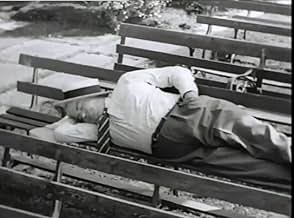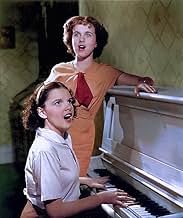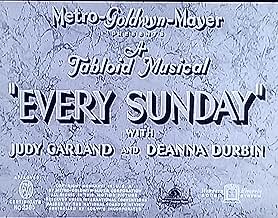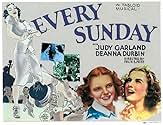Agrega una trama en tu idiomaTwo teenage girls lend their fantastic singing voices to the cause when the city council threatens to replace the orchestra led by one girl's grandfather as the regular entertainment at the ... Leer todoTwo teenage girls lend their fantastic singing voices to the cause when the city council threatens to replace the orchestra led by one girl's grandfather as the regular entertainment at the Sunday concert-in-the-park series.Two teenage girls lend their fantastic singing voices to the cause when the city council threatens to replace the orchestra led by one girl's grandfather as the regular entertainment at the Sunday concert-in-the-park series.
- Dirección
- Guionista
- Elenco
Clem Bevans
- Man playing checkers
- (sin créditos)
Jules Cowles
- Man in Audience
- (sin créditos)
Paul Irving
- Mr. Bixby
- (sin créditos)
Wright Kramer
- The Professor
- (sin créditos)
Thomas Pogue
- Mr. Barfogle
- (sin créditos)
Richard Powell
- Pop, Judy's Father
- (sin créditos)
Kathryn Sheldon
- Woman Gotten out of Bath
- (sin créditos)
Tammany Young
- Man Sleeping on Bench
- (sin créditos)
- Dirección
- Guionista
- Todo el elenco y el equipo
- Producción, taquilla y más en IMDbPro
Opiniones destacadas
Every Sunday is an eleven minute short subject featuring the talents of two of its young juvenile contract players, a pair who would develop into players of note in the future. It's interesting and entertaining to see the contrasting styles of Judy Garland and Deanna Durbin as they perform at a Sunday concert for Deanna's uncle.
Of course no one knew how big both of these young ladies would get to be. I've always wondered why Mayer kept Garland and let Durbin go to Universal. L.B. always had pretensions to culture and this was the guy who had Jeanette MacDonald at his studio and later on hired such lovely soprano voices as Jane Powell, Ann Blyth, Doretta Morrow, etc.
Judy certainly had her glorious career at MGM, but she paid a heavy price for it. Deanna, along with Abbott&Costello and several Gothic horror monsters preserved Universal pictures. She was smart enough to get out at the top and make it stick.
So, in their salad days, Deanna Durbin and Judy Garland.
Of course no one knew how big both of these young ladies would get to be. I've always wondered why Mayer kept Garland and let Durbin go to Universal. L.B. always had pretensions to culture and this was the guy who had Jeanette MacDonald at his studio and later on hired such lovely soprano voices as Jane Powell, Ann Blyth, Doretta Morrow, etc.
Judy certainly had her glorious career at MGM, but she paid a heavy price for it. Deanna, along with Abbott&Costello and several Gothic horror monsters preserved Universal pictures. She was smart enough to get out at the top and make it stick.
So, in their salad days, Deanna Durbin and Judy Garland.
In itself, this is a lightweight short feature with a predictable story, but it is well worth seeing as a pleasant part of cinema history. Seeing Deanna Durbin and Judy Garland together so early in their careers is a treat for anyone who has enjoyed their later pictures, and their energy and obvious talent more than make up for any lack of depth in the rest of the movie.
The plot is a simple one, with the two young women devoting themselves to saving a local concert series. What's interesting about it is seeing Durbin and Garland perform, since even at such a young age the difference in their styles is already pronounced. Deanna and Judy were both clearly ready for bigger opportunities.
This kind of feature probably doesn't hold an interest for a wide audience today, but for those who appreciate the classic musicals, it's worth seeing as a piece of movie history.
The plot is a simple one, with the two young women devoting themselves to saving a local concert series. What's interesting about it is seeing Durbin and Garland perform, since even at such a young age the difference in their styles is already pronounced. Deanna and Judy were both clearly ready for bigger opportunities.
This kind of feature probably doesn't hold an interest for a wide audience today, but for those who appreciate the classic musicals, it's worth seeing as a piece of movie history.
It was 1936 and MGM had acquired both Judy Garland and Deanna Durbin. Both about the same age, a little too old for kiddie movies, not quite ready for romantic leads yet. Add in the fact the neither of the girls had much experience in front of the camera. What do we do with them? Risk it all prematurely on a big budget full length feature? Nope...you start them both off in one short, designed to showcase each girls individual talent (Deanna was already being groomed as the "operatic" one, Judy as the "hot swing jazz" singer). And pull together a plot that is merely an excuse for us to hear these girls sing. Both girls went on to success in movies, each with their own particular style, but this was a part of their education and we, luckily, get to see it today.
8tavm
Having previously seen this short on VHS tape with the feature Summer Stock, I just rewatched Every Sunday on the TCM site. It marked the film debut of 15-year-old Deanna Durbin and of 14-year-old Judy Garland outside of her two older sisters. These two teens showcase their musical talents with a solo from Deanna of "Il Bacio", then one from Judy of "Waltz with a Swing" before the two climax with "Americana". The slight plot of this 11-minute film concerns the possible unemployment of Edna's (Durbin's real first name which is the way she's addressed here) grandfather's conducting job at the park because of low attendance. With the two girls' help, you can probably guess what happens from there! Contrasts are marked not only with Garland's and Durbin's musical choice but also with their height, poise, and movement. Despite all that, they perform quite well at the end and it's almost surprising that M-G-M chose Garland while Durbin was already contracted at Universal as this short was made but was briefly allowed back in since her feature debut (Three Smart Girls) was in the early preparing stages. Judy herself would make her first feature (Pigskin Parade) at 20th Century-Fox as M-G-M was deciding what movie she would next star in. That would be Broadway Melody of 1938 where she would perform the show stopping number, "Dear Mr. Gable (You Made Me Love You)". But back to this short, Every Sunday provides a warm and wonderful glimpse of two star singers at the beginning of their legendary careers unaware of what the future holds for them...
Every Sunday was basically made as a screen test for MGM execs to choose which prodigy they wanted to contract. Obviously, they chose Garland, and Durbin went on to great success for Universal in "Three Smart Girls".
I love this short film, and although it has no plot, it is interesting to observe the dueling divas sing their hearts out.
I love this short film, and although it has no plot, it is interesting to observe the dueling divas sing their hearts out.
¿Sabías que…?
- TriviaThis film was not (as is often reported) a "screen test" of sorts produced by MGM to help the studio decide which of these two girls, Deanna Durbin or Judy Garland, to keep under contract. Durbin was released by MGM and signed by Universal prior to this movie's production. A blurb on 1 June 1936 in "The Hollywood Reporter" stated "Universal had changed Canadian-born Edna Mae Durbin's name to 'Dianna' [sic]." This movie, it appears, was not produced until at least July 1936, by which time Durbin had already been signed by Universal and cast in her debut vehicle, Three Smart Girls (1936). The reason she appeared in this film was reportedly due to a provision in her MGM contract which entitled the studio to request her services for up to 60 days following its termination, provided she was not already shooting a film at her new studio. As filming on "Three Smart Girls" was not scheduled to begin until September 1936, Durbin found herself back at MGM making this short with Garland. This is why, although her on-screen character is called "Edna" in the short (Deanna's real name), in the credits she is billed under the name by which she would soon become internationally famous, "Deanna".
- ErroresWhen the girls are singing, their mouths do not always match the soundtrack.
- ConexionesFeatured in Érase una vez en Hollywood (1974)
Selecciones populares
Inicia sesión para calificar y agrega a la lista de videos para obtener recomendaciones personalizadas
Detalles
- Fecha de lanzamiento
- País de origen
- Idioma
- También se conoce como
- Каждое воскресенье
- Locaciones de filmación
- Productora
- Ver más créditos de la compañía en IMDbPro
- Tiempo de ejecución
- 11min
- Color
- Relación de aspecto
- 1.37 : 1
Contribuir a esta página
Sugiere una edición o agrega el contenido que falta




























